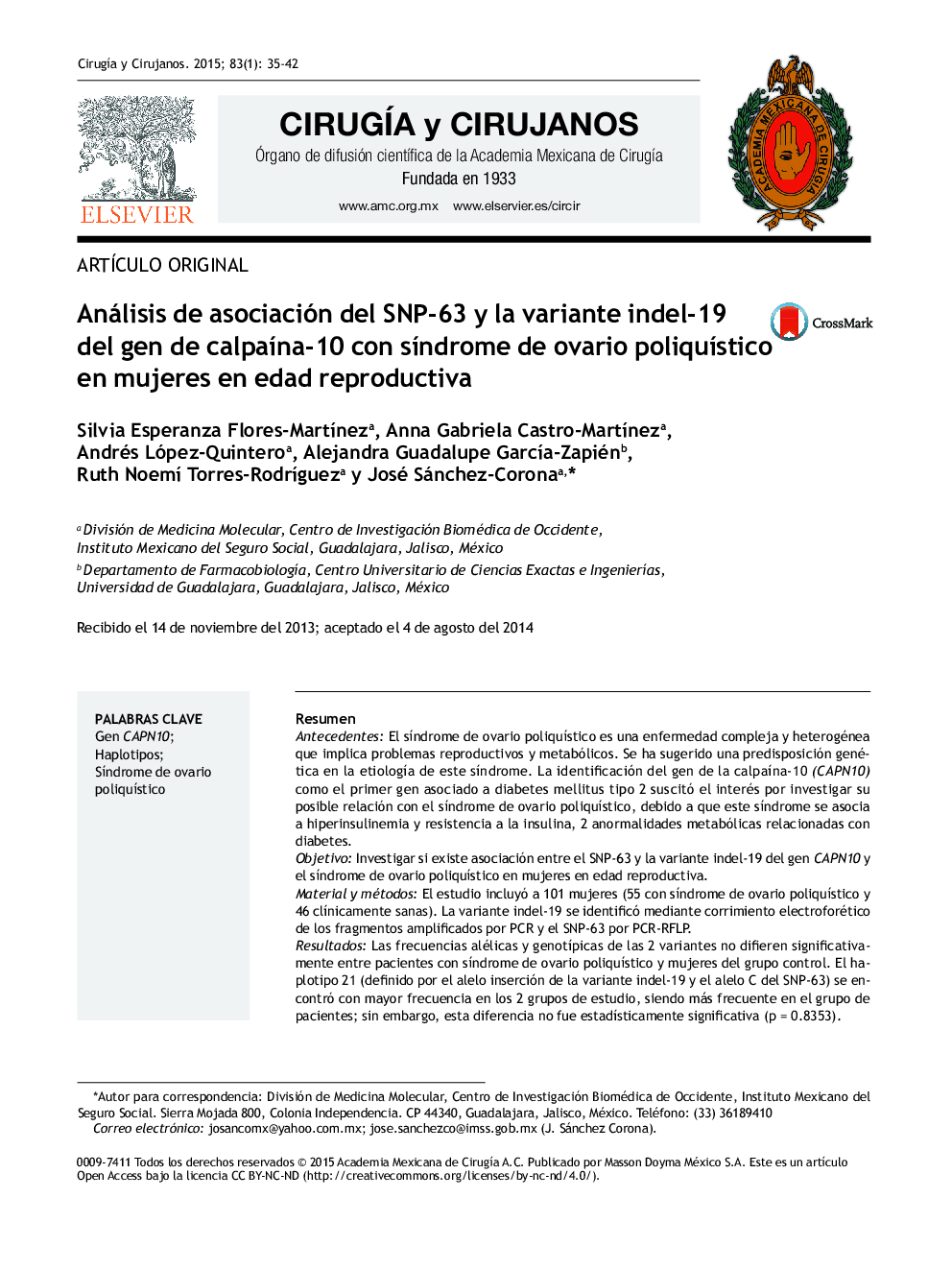| Article ID | Journal | Published Year | Pages | File Type |
|---|---|---|---|---|
| 4283203 | Cirugía y Cirujanos | 2015 | 8 Pages |
ResumenAntecedentesEl síndrome de ovario poliquístico es una enfermedad compleja y heterogénea que implica problemas reproductivos y metabólicos. Se ha sugerido una predisposición genética en la etiología de este síndrome. La identificación del gen de la calpaína-10 (CAPN10) como el primer gen asociado a diabetes mellitus tipo 2 suscitó el interés por investigar su posible relación con el síndrome de ovario poliquístico, debido a que este síndrome se asocia a hiperinsulinemia y resistencia a la insulina, 2 anormalidades metabólicas relacionadas con diabetes.ObjetivoInvestigar si existe asociación entre el SNP-63 y la variante indel-19 del gen CAPN10 y el síndrome de ovario poliquístico en mujeres en edad reproductiva.Material y métodosEl estudio incluyó a 101 mujeres (55 con síndrome de ovario poliquístico y 46 clínicamente sanas). La variante indel-19 se identificó mediante corrimiento electroforético de los fragmentos amplificados por PCR y el SNP-63 por PCR-RFLP.ResultadosLas frecuencias alélicas y genotípicas de las 2 variantes no difieren significativamente entre pacientes con síndrome de ovario poliquístico y mujeres del grupo control. El haplotipo 21 (definido por el alelo inserción de la variante indel-19 y el alelo C del SNP-63) se encontró con mayor frecuencia en los 2 grupos de estudio, siendo más frecuente en el grupo de pacientes; sin embargo, esta diferencia no fue estadísticamente significativa (p = 0.8353).ConclusionesLos resultados sugieren que el SNP-63 y la variante indel-19 del gen CAPN10 no son factores de riesgo para síndrome de ovario poliquístico en nuestro grupo de pacientes.
BackgroundPolycystic ovary syndrome is a complex and heterogeneous disease leading to reproductive, as well as metabolic problems. It has been suggested that there may be a genetic predisposition in the aetiology of polycystic ovary syndrome. The identification of calpain 10 gene (CAPN10) as the first candidate gene for type 2 diabetes mellitus has focused the interest in investigating their possible connection with the polycystic ovary syndrome. This syndrome is associated with hyperinsulinaemia and insulin resistance, two metabolic abnormalities associated with type 2 diabetes mellitus.ObjectiveTo investigate if there is association between the SNP-63 and the genetic variant indel-19 of CAPN10 gene and polycystic ovary syndrome in women of reproductive age.Material and methodsThis study included 101 women (55 with polycystic ovary syndrome and 46 without polycystic ovary syndrome). The genetic variant indel-19 was identified by electrophoresis of the amplified fragments by PCR, and the SNP-63 by PCR-RFLP.ResultsThe allele and genotype frequencies of the two variants do not differ significantly between women with polycystic ovary syndrome and the control women group. The haplotype 21 (defined by the insertion allele of indel-19 variant and C allele of SNP-63) was found with higher frequency in both study groups, being more frequent in the polycystic ovary syndrome patients group, however, this difference was not statistically significant.ConclusionsThe results suggest that SNP-63 and indel-19 variant of CAPN10 gene do not represent a risk factor for polycystic ovary syndrome in our patient group.
